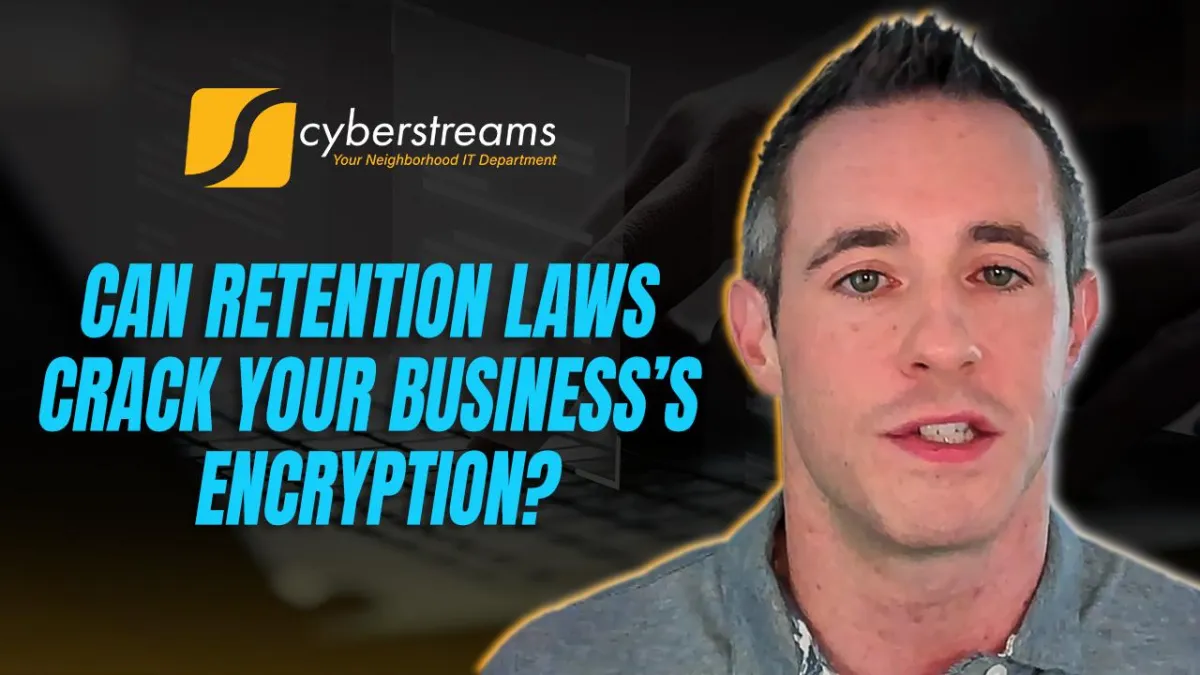
Can Retention Laws Crack Your Business’s Encryption?
At CyberStreams, we work with small and medium-sized businesses (SMBs) to help secure communications while navigating the maze of compliance regulations. One of the gold standards in digital privacy is end-to-end (E2E) encryption, where only the sender and the recipient can read the data. But a pressing question remains: can true E2E encryption exist in industries where data retention laws mandate message storage?
The E2E Encryption Paradox
E2E encryption is built on the principle that even service providers shouldn't be able to access encrypted data. However, mandatory retention regulations, especially in finance, healthcare, and other regulated sectors, create an inherent conflict. For example, SEC Rule 17a-4 requires financial institutions to store certain communications for up to seven years. To comply, providers often retain encrypted messages on their servers, which can become a security weak point.
A real-world example highlights the risk. In 2023, a breach at a major cloud storage provider compromised retained email archives for over 50,000 businesses, despite those communications being encrypted. The weak link? Poor key management (Zscaler, 2024).
Compliance vs. Privacy
It’s not just financial regulations that complicate things. Frameworks like HIPAA and GDPR require both data privacy and retention. HIPAA mandates the storage of patient communications for six years. But failure to properly secure this data can be costly, non-encrypted storage breaches in 2024 resulted in fines totaling $20 million (HHS, 2025).
Even platforms like Microsoft Teams and Signal, which advertise E2E encryption, often bend the rules in "compliance modes" by storing encryption keys server-side, which weakens security. It’s a necessary compromise for meeting legal retention requirements, but it dilutes the true promise of E2E.
SMB Frustration Is Growing
It’s not surprising that SMBs are growing increasingly frustrated. Many feel misled by vendors’ vague E2E claims. Worse, some business owners are unaware their data is even accessible to third parties.
High-profile breaches only add to the concern. The 2024 MOVEit breach affected 2,600 organizations, showing that encrypted data at rest is still a hacker target (IBM X-Force, 2025). True E2E encryption would mean ephemeral data, communication that disappears after it's read. But retention laws make this unachievable for most SMBs.
As a result, 41% of breaches in 2024 were traced back to misconfigured storage systems (Verizon DBIR, 2025). This isn’t just a tech problem, it’s a business risk with real financial consequences.
What Can Your Business Do?
At CyberStreams, we help SMBs strike a practical balance between encryption and compliance. Here are three actionable takeaways to strengthen your security posture:
1. Audit Communication Tools
Review your messaging and collaboration platforms. Do they really provide E2E encryption? Are they storing data in ways you didn’t anticipate? Our Cyber Fit Assessment is designed to uncover these hidden gaps.
2. Conduct Regular Compliance Checks
Set a schedule ideally quarterly to review data retention practices and ensure compliance. Our training platform includes up-to-date GDPR and HIPAA modules to help your team stay current.
3. Identify and Protect Regulated Data
Perform a system-wide scan to locate any unencrypted regulated data. Knowing what you have, and the potential risks and fines if it’s breached, is essential. Our Data Security Risk Assessment can help map out these vulnerabilities.
Conclusion
True end-to-end encryption is a powerful ideal, but in heavily regulated industries, it's often compromised by the need to retain records. This paradox leaves many SMBs stuck in a difficult spot, juggling between compliance obligations and strong cybersecurity.
The key isn’t choosing between security and compliance, it’s achieving the right balance between the two. At CyberStreams, we specialize in helping businesses thread this needle with confidence. Whether you need help auditing tools, training staff, or identifying data risks, we’re here to support your journey toward both compliance and peace of mind.
